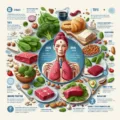The Importance of Minerals for Energy
Feeling tired and run down lately? Many people struggle with fatigue due to busy schedules, lack of sleep, and poor diet. While getting enough rest is crucial, nutrition also plays a big role in energy levels. In particular, certain minerals are vital for keeping your body energized throughout the day.
Minerals That Provide an Energy Boost
The three minerals most linked to improved energy are:
- Iron
- Magnesium
- Zinc
These micronutrients power many essential functions that convert the food you eat into cellular fuel. By ensuring you get enough iron, magnesium and zinc each day, you can enjoy sustained energy for work, exercise, and other daily tasks.
The Role of Iron
Iron enables red blood cells to carry oxygen efficiently. Without adequate iron, you may become anemic leading to exhaustion, weakness, and shortness of breath. Adults need around 8-18 mg of iron per day depending on age and gender. Iron-rich foods include red meat, poultry, seafood, nuts, beans, spinach and fortified breakfast cereals.
Why Magnesium Matters
Magnesium is involved in over 300 critical biochemical reactions in the body. It activates enzymes needed for energy metabolism, protein production, and muscle movements. Low magnesium often manifests in symptoms like chronic fatigue, muscle cramps, and weakness. For healthy adults, the RDA for magnesium is 310-420 mg per day from foods like dark leafy greens, nuts, seeds, fish, whole grains, yogurt and beans.
Zinc’s Role
Zinc enables immune defenses, growth and development, digestion, DNA production, and key metabolic pathways. Without adequate zinc, you may experience lackluster energy, frequent illnesses, poor appetite, stunted growth and other issues. Adult women need 8 mg of zinc per day while men require 11 mg per day. Zinc is abundant in oysters, red meat, poultry, beans, nuts, and dairy products.
FAQ on Minerals and Energy
What causes tiredness and fatigue?
Common causes include lack of sleep, stress, medical conditions like anemia or thyroid disorders, poor diet, dehydration, medications, depression and overexertion. Pay attention to patterns in your fatigue to determine the underlying reason.
What dietary changes increase energy?
Eating more fruits, vegetables, whole grains, nuts, seeds, eggs, lean protein and healthy fats gives your body the optimal fuel for energy. Stay hydrated, limit caffeine and alcohol which can dehydrate you or disrupt sleep. Also, ensure adequate intake of iron, magnesium and zinc.
What lifestyle habits boost energy levels?
Getting 7-9 hours of quality sleep per night, regular exercise appropriate for your fitness level, stress management techniques, exposure to natural daylight, and consumption of water and nutrient-dense foods throughout the day all enhance energy over time.
How long until I feel the effects?
You may notice subtle improvements in endurance right away. But allow at least 1-2 weeks for iron, magnesium and zinc supplementation to restore any deficiencies and build up adequate reserves. Combine with diet, sleep and lifestyle adjustments for the best, long-lasting results in energy.
Who is most at risk for mineral deficiencies?
Those who eat a largely restricted or processed diet, athletes and extremely active people, the elderly, those with digestive disorders, post-surgical patients, and pregnant or breastfeeding women have higher risk for deficiencies. Also people taking certain medications long term may benefit from supplementation under medical supervision.









